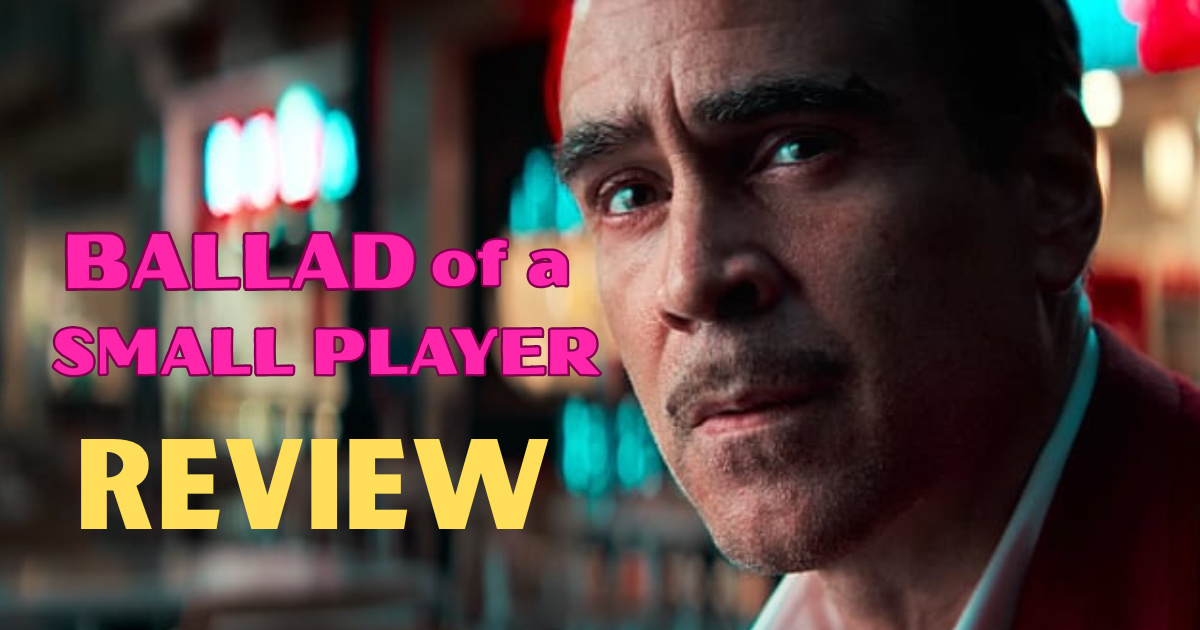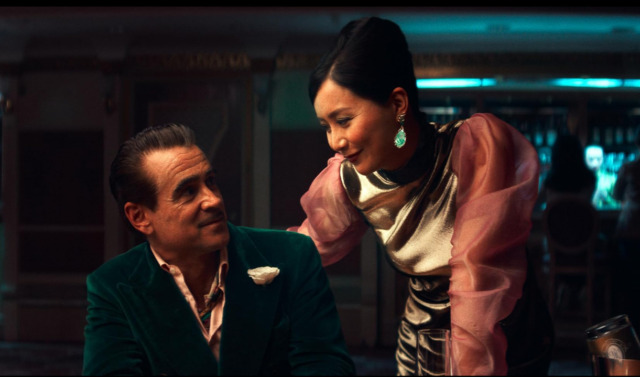‘Ballad of a Small Player’ is Energetic, Stylish yet Familiar

Ballad of a Small Player is a fascinating follow-up to Edward Berger’s Conclave. Most of Conclave’s tone was overly serious and at times felt like a detective procedural wearing a pope’s uniform. Ballad of a Small Player is a complete gear shift in terms of style and feel. The film oftentimes has an enthralling, fast-paced energy that keeps the viewer hooked on every plot development. Simultaneously, the screenplay takes a right turn into a frustratingly familiar place that feels out of step with the rest of the film.
Even so, Colin Farrell has an undeniable magnetic performance here as a deeply flawed gambler who continually makes his problems worse. It’s a fascinating balance of a character who teeters on the line between sympathetic and pathetic.
What is Ballad of a Small Player about?
The film centers on Lord Doyle (Colin Farrell), a compulsive gambler drowning in debt who lives in a hotel-casino in Macau, China. Doyle has an overly wealthy presentation in style and sports an Inspector Clouseau mustache. However, beneath Lord Doyle is a weak gambler who throws away any financial opportunities presented to him. The film has an anxious energy through these first moments with Doyle. Each time the viewer believes he cannot make his situation possibly worse, he throws more money into a game of baccarat and loses everything.
In one of his lowest moments, Doyle finds solace in a casino worker named Dao Ming (Fala Chen), who spends a melancholic night with Doyle on the beach. He soon wakes up to an offer from Ming that could potentially change his life. And in the mix of uncertainty about where he might eat his next meal or keep the same hotel room, an investigator named Blithe (Tilda Swinton) tracks him down for a client that Doyle conned in a past life.
The screenplay by Rowan Joffe, adapted from a novel by Lawrence Osborne, then unfolds like a spiritual parable. Doyle’s world becomes surreal as luck and misfortune begin to blur, and his position spirals into a dreamlike frenzy. With the change comes a question of “why,” and that reason seems to be a test. Dao Ming subtly hints at the notion in a conversation in which she tells him a parable about a man with a big appetite but a skinny neck.

Edward Berger’s follow-up is energetic and gorgeous
Throughout the first two acts, Berger keeps the movie pulsing. The editing is slick and tight, running at a brisk 101 minutes, which for a movie with this many Oscar nominees is rare. The incessant gambling gives the first half a relentless feel of peril. It could be the present-day economy, but watching Doyle continually gamble his hardship somehow feels relatable in a time when even the middle class is living paycheck to paycheck. The only difference is that Doyle is a victim of his own making. He has thrown everything away for another dopamine hit at the baccarat table. And while Doyle should be unsympathetic as a character, it’s Farrell’s magnificent talent that gives Doyle an unexpected vulnerability.
Cinematographer James Friend takes full advantage of the casino aesthetic, making numerous scenes splashed with Vegas-style lights. A simple shot of Doyle descending an escalator feels like the environment of Macau lights Doyle cosmically. No matter the response to Ballad of a Small Player, its gorgeous photography is undeniable.
Rowan Joffe’s script is spiritually interesting but derivative
The film’s ultimate downfall is its third act, where certain plot twists that were already obvious to the viewer unravel. Ballad of a Small Player is similar to Martin Scorsese’s decision to adapt Shutter Island after winning the Oscar for The Departed. Shutter Island was a beautifully shot film with great performances and masterfully done tension, but the final moments of the movie felt derived from several twist endings that have been done before. The odd part is that the film’s language plays the final moments like a big reveal, even though a sequence 20 minutes earlier actively spells it out to the audience.
Additionally, for a movie that depends on high-stakes gambling in baccarat, it is uninterested in explaining the rules. I have never played the game and found many sequences devoid of stakes because there was no path to follow. The scenes possess a riveting design, but knowledge of the gaming mechanics could easily enhance some of them.
Despite these grievances, a spiritual undertone throughout the film draws one into the atmosphere. The movie plays like a parable about the never-ending chase of wealth and addiction. It’s far from a perfect movie, but the supernatural flourishes give the experience a refreshing quality at times.
Overall, Edward Berger’s follow-up to Conclave will be met with mixed reactions if expecting the same caliber of film. Ballad of a Small Player feels like Berger letting his hair down and having a little more fun. Some serious themes are being explored here, but for the most part, Ballad of a Small Player is a messy night out for drinks after a formal ceremony.
Also check out Roofman: An Absolute Charmer That’s an Enduring Portrait of A True Story


